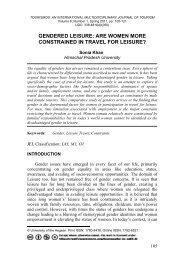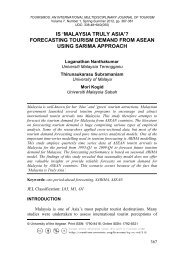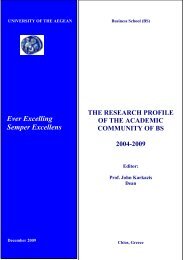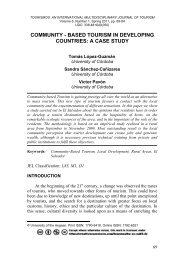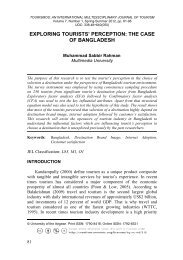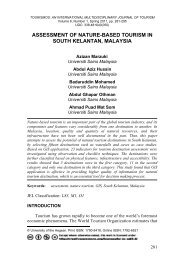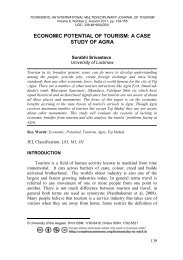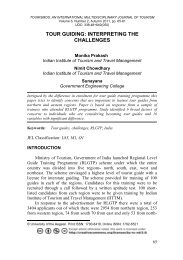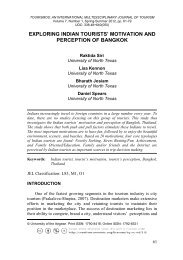TOURISMOS is an international, multi-disciplinary, refereed (peer ...
TOURISMOS is an international, multi-disciplinary, refereed (peer ...
TOURISMOS is an international, multi-disciplinary, refereed (peer ...
You also want an ePaper? Increase the reach of your titles
YUMPU automatically turns print PDFs into web optimized ePapers that Google loves.
<strong>TOURISMOS</strong>: AN INTERNATIONAL MULTIDISCIPLINARY JOURNAL OF TOURISM<br />
Volume 6, Number 1, Spring 2011, pp. 53-68<br />
UDC: 338.48+640(050)<br />
from service providers, etc.). And even when all the obstacles have been<br />
overcome, outside ch<strong>an</strong>ges, as with the appear<strong>an</strong>ce of new st<strong>an</strong>dards (cf.<br />
ch<strong>an</strong>ges related to development <strong>an</strong>d sustainable tour<strong>is</strong>m) or new<br />
regulations that c<strong>an</strong> lead to failure of certain suppliers, service providers<br />
or subcontractors, make some equipment obsolete (swimming pool, tenn<strong>is</strong><br />
court, hotels, etc.), <strong>an</strong>d finally prevent fulfilment of the strategy.<br />
The perceived difficulties are also related to <strong>an</strong> underestimation of<br />
the complexity <strong>an</strong>d innovative character of the technologies implemented<br />
(information <strong>an</strong>d communication technologies not effectively controlled<br />
for example). According to the players questioned, these are largely<br />
caused by a “lack of competence”, zeal for “perfection<strong>is</strong>m” or “lack of<br />
alternative solutions”. They c<strong>an</strong> also be related to m<strong>an</strong>agement problems<br />
due to a chronic lack of personnel, <strong>an</strong> element which leads to take into<br />
consideration the links between uncertainty <strong>an</strong>d work on a daily bas<strong>is</strong>.<br />
Uncertainty during project roll-out<br />
Beside the tour<strong>is</strong>t product itself, th<strong>is</strong> other type of uncertainty<br />
generates a certain number difficulties likely to affect forecasts for the<br />
future. Indeed, r<strong>an</strong>dom factors in development lead to drifting of costs<br />
<strong>an</strong>d design <strong>an</strong>d development lead times. While it would be unreal<strong>is</strong>tic to<br />
attempt here to account for all the possible sources of uncertainty that c<strong>an</strong><br />
affect a project, a brief presentation of those most often mentioned during<br />
our interviews will nevertheless provide a clear illustration of the<br />
import<strong>an</strong>ce of information related aspects in the emergence of a tour<strong>is</strong>t<br />
product.<br />
Project m<strong>an</strong>agement mainly involves org<strong>an</strong><strong>is</strong>ing a process of<br />
acqu<strong>is</strong>ition of knowledge <strong>an</strong>d dec<strong>is</strong>ion-making while co-ordinating the<br />
activity of various special<strong>is</strong>ts (Boutinet, 1998). Now, the acqu<strong>is</strong>ition of<br />
knowledge required for the project c<strong>an</strong> be affected by a host of<br />
malfunctions, including especially patchy knowledge in the field of<br />
technology watch or capital<strong>is</strong>ation on know-how, too frequent rotation of<br />
personnel, <strong>an</strong> uneven representation of different skills, a dearth or<br />
conversely <strong>an</strong> excess of information available, the unreliable nature of<br />
that information or its non-synthetic nature. In th<strong>is</strong> perspective, the<br />
quality of information exch<strong>an</strong>ged becomes essential. Th<strong>is</strong> depends mainly<br />
on the “positive attitude” of the players whose behaviour c<strong>an</strong> lead to a<br />
lack of tr<strong>an</strong>sparency <strong>an</strong>d mutual trust. Such behaviour patterns r<strong>an</strong>ge from<br />
withholding information (seen as a way of holding power) to<br />
d<strong>is</strong>simulating errors that may have been committed (whence difficulties<br />
pl<strong>an</strong>ning for the future on the bas<strong>is</strong> of what has been learnt from the past),<br />
57



